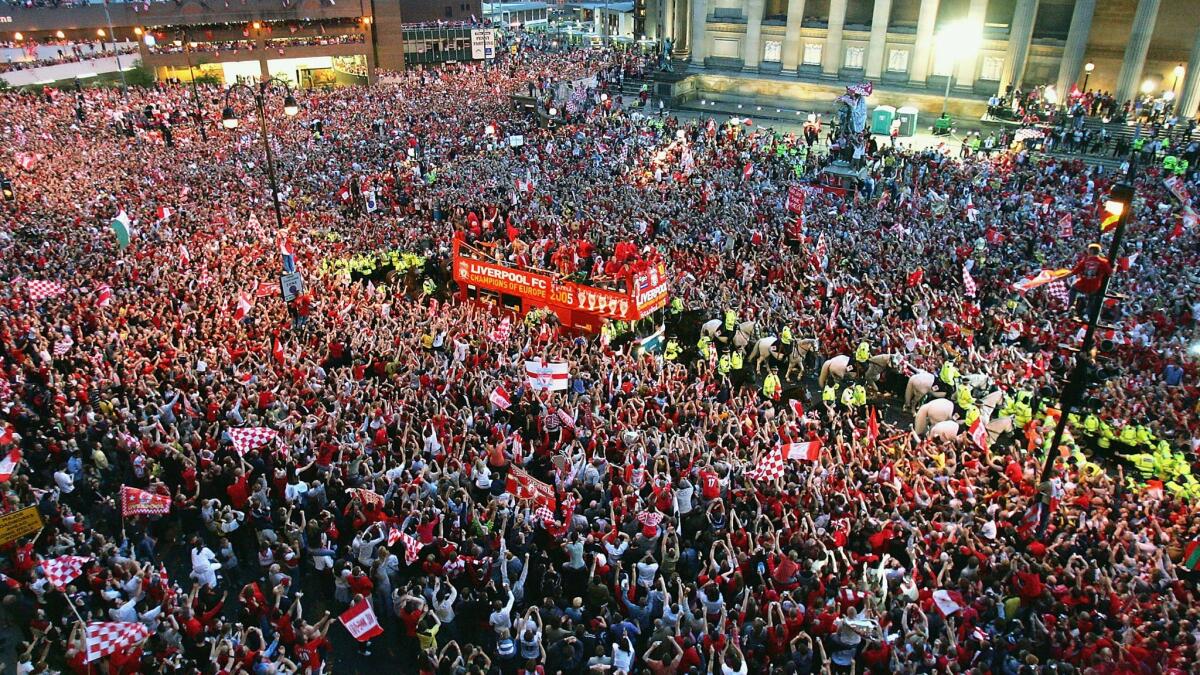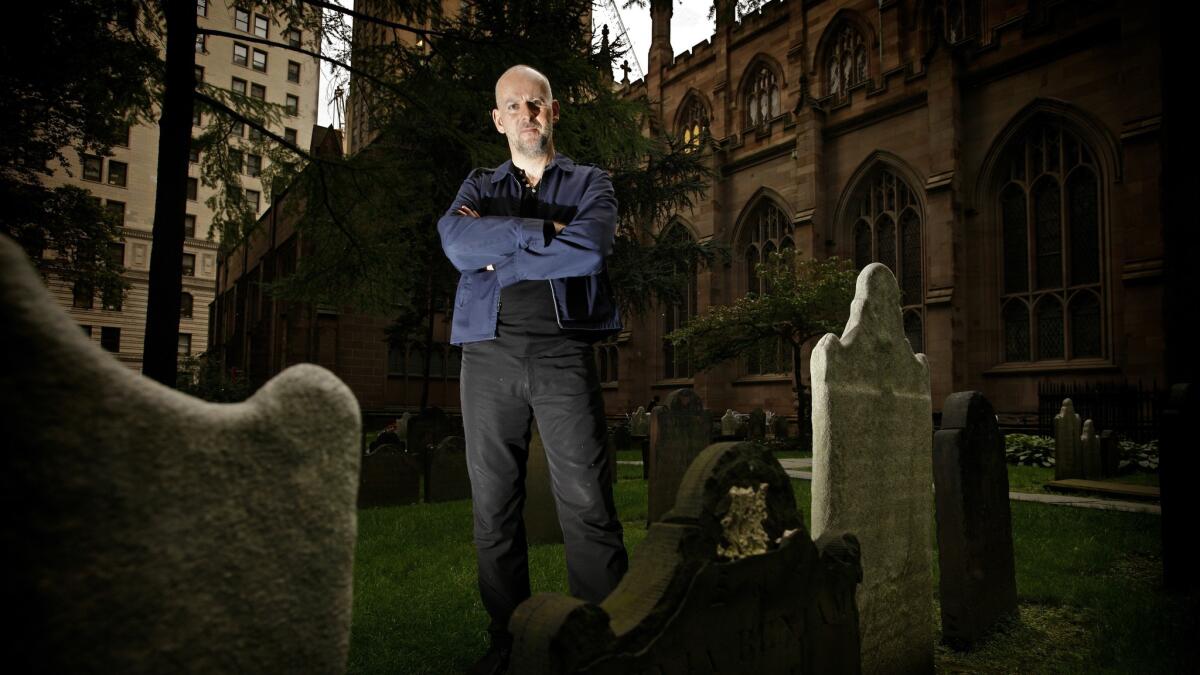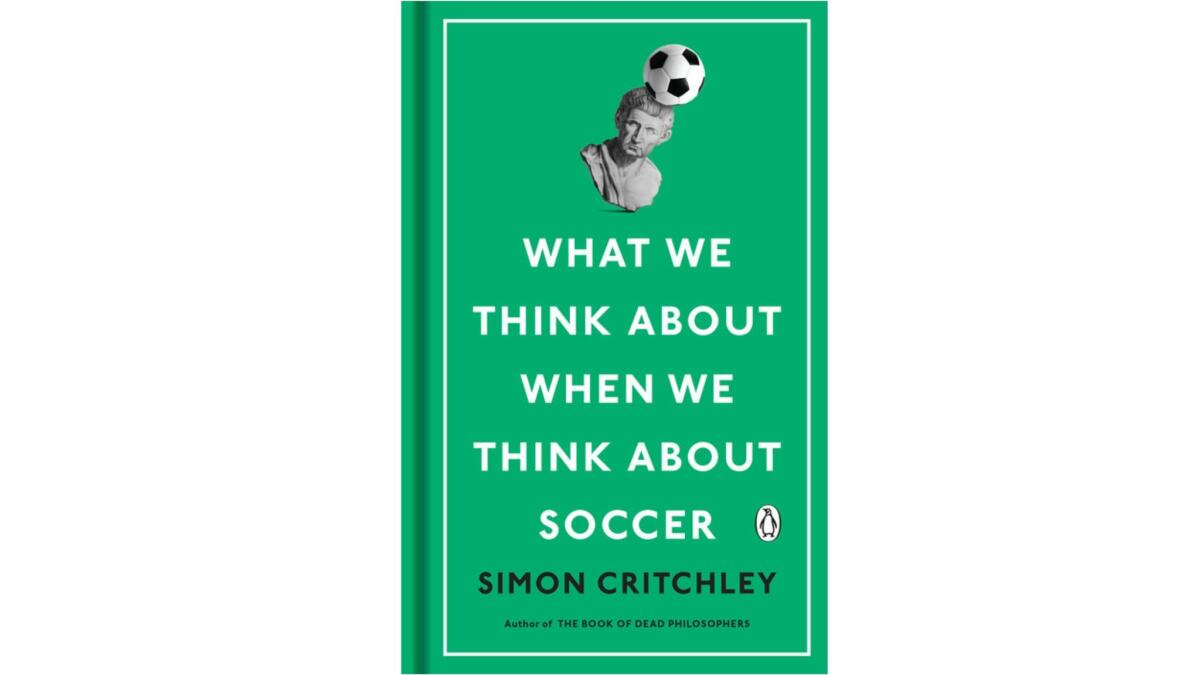Q&A: Simon Critchley on football, philosophy and his new book ‘What We Think About When We Think About Soccer’

Soccer, according to Simon Critchley’s new book “What We Think About When We Think About Soccer,” is “working-class ballet.” Likewise, Critchley is what one might call a “working-class philosopher,” by which I mean he sees philosophy as a proletarian concern rather than an elite activity to be practiced in ivory towers. He approaches every subject — be it suicide or soccer — with the same intellectual rigor. The writing is not only deep and philosophical, but approachable and conversational.
Soccer would have once, not too long ago, been seen as a topic unsuitable for intellectual analysis, something beneath the dignity of philosophical inquiry. The “philosophy of soccer” has yet to be — forgive the pun — tackled.
“To be clear,” Critchley explains, “I am not here attempting to write a ‘philosophy of football.’” (Football, of course, is what the rest of the world calls soccer.) Instead, he writes what I would describe as a “football of philosophy,” in which he discovers “that much of what I believe to be true philosophically — about matters as general as space, time, passion, reason, aesthetics, morals and politics — turns out to be most true of football.” Thus, he sets forth to persuade the reader not that philosophy can give insight into soccer but that soccer can give us insight into philosophy and what it means to be a human being in the world.
I spoke to Critchley when he visited Los Angeles recently. Our conversation has been edited.
You’ve explored a wide range of topics — David Bowie, suicide, Emmanuel Levinas, “Hamlet,” Wallace Stevens — what made you decide to write a book on soccer?
In the last 10 years or so, I’ve been explicit in trying to explain my elemental passions. Soccer may be the most elemental passion I have. It’s the one that goes back the furthest and deepest. I have a deep elemental passion for David Bowie as well, but soccer is somehow deeper because it’s bound up with place — fantasies of place. The only thing my family felt it had going for it was that we were from Liverpool. The main proof of the existence of the place we were from was our team. My dad was a fanatical Liverpool Football Club fan and a kind of connoisseur of the game. It’s the main thing we talked about.
Much of what I believe to be true philosophically...turns out to be most true of football.
— Simon Critchley
You’re enamored with soccer fans. The book is as much an exploration of the culture surrounding the game as it is the game itself. How does the culture relate to, as you write, the socialism of the game?
In a country like Britain, which was arguably a socialist or social democratic country in the decades following the Second World War before being swiftly demolished by Margaret Thatcher and what came after, soccer is perhaps the last vestige of that socialist ideal. It’s a game that values community, being together as equals, where everyone has a right to say something. There’s a socialism of the game itself — association football — and a socialism of the culture surrounding the game. Soccer is a repository for a kind of fellow feeling, a sense that we’re all in this together. Players may come and go, but the fans are there for an awful long time, and they have a memory. They’re the archive, the library.
You write about a team’s “history of moments” that fans carry with them. Can a person be a true fan if he isn’t associated with a particular team?
Sure. People can watch in whatever way they choose. You’ve got the occasional fan who maybe likes the festive aspect of the four-year tournament, whereas serious fan culture is more about this powerful lived sense of continuity with a team, with a place, with a history. By definition not every team can win. Most teams are going to lose. So, to be a fan of a team and to be a scholar of the history of that team is also to be schooled in failure and disappointment. Disappointment is constitutive, but there’s a phenomenon of hope — a hope beyond reason, a hope against hope. So maybe what differentiates the occasional fan from the serious fan is the realism of the serious fan. They realize that this is probably going to end badly, and they’re not going to win anything, and the club’s going to be mismanaged, but they will persist with it because that’s who they are. What’s amazing about fan culture is the way in which it is transmissible down the generations.
In the last couple decades, would you say a discourse has grown around soccer?
Yes, it was a little bit of a dirty secret when I was a student. Soccer now is a very different animal. There’s a discourse around it and an international viewing public. It’s the biggest sport in the world. It commands an extraordinary amount of attention. The internet has been bad for some things, like human life, but good for other things, like soccer. The internet has opened up a serious level of discourse on the sport. That’s very different from how it was in the ’80s when I was a student. I kept my love of the game — and Liverpool Football Club in particular — to myself. The only writing about it at the time was on the back pages of the tabloid newspapers in England. Since the publication of Nick Hornby’s “Fever Pitch” in 1992, there’s been a spectacular rise in serious soccer writing.

Perhaps the most shocking thing to me about the book is that you, in a brief aside in the preface, admit to liking — and perhaps preferring — the name “soccer.”
Yes, it’s more social, in a sense. Soccer is an abbreviation of the “association” that’s at the heart of the game. In many ways, soccer is more accurate. Not only because it gets at the association — the socialism — that I’m interested in, but because soccer is a game played with the whole body, not just the feet.
What’s one thing the U.S. could do to increase its presence and success in international soccer?
There are a number of answers to this question, but one is that the popularity of the game in the Latino population needs to be brought into the soccer mainstream. That would be something with a profound political effect. When I think about my team, I know our best player is Brazilian and our second best player is Egyptian. If the team that you love and you watch every week is dominated by foreigners, it gives you a different view of the world. There are some English players in there too, but you get a much more international feel.
Are you saying the game in some way makes it harder to be xenophobic?
It’s a tremendous corrective to xenophobia. The game itself — or at least the idea of a game where you kick a ball with your feet — goes back to the Mayans and ancient China. A game like this was played in Italy in the Middle Ages. Then it was codified in Britain in the late 19th century. Thus, we think it’s our game, but it isn’t. It’s a game played better by just about everyone else.
If the team that you love and you watch every week is dominated by foreigners, it gives you a different view of the world.
— Simon Critchley
Is this part of what makes the game a repetition without origin?
Yes, and that is an anti-nationalist point. For English fans to say, “Football is an English game, and we have a right to it, because it began here,” is nonsense. The origin of the game is unimportant. History is much more multifarious and complex. To experience soccer is to experience the repetition of this ritual. All the games are alike. There will be 22 players on the pitch. It will last for 90 minutes. There is a repetitive structure, yet the repetition of soccer allows for novelty, innovation and creation. Soccer is commanded by laws — the 17 laws of the game — and yet within that set of rules there can be novel forms of activity, something new can emerge. Laws are malleable. There can be cheating. There is an art to bending rules.
What could philosophy learn from soccer?
Soccer is a great place for reasoned debate. In many ways, it is what philosophy should be: reasoned dialogue based on strongly held emotions where you’re able to change people’s minds through the force of argument. Sadly, in philosophy that rarely happens, but in conversations about soccer, it does happen. I’ll offer a certain opinion about a player or a match, and someone will say, “no, you’re completely wrong, it’s like this...” I’ll listen to what they’re saying and maybe come up with a few objections, but often I’ll change my mind. So there’s something truly philosophical about soccer. It’s a place where people feel comfortable and relaxed in their opinions, as well as comfortable and relaxed in conversation.

Yet one thing you’re fascinated with is the disgust inherent in soccer as well — through capitalism, corruption, etc. Would soccer be better if you could get rid of those disgusting aspects? Could it truly become that socialistic game of pure association? Or is that disgust an essential part of what makes soccer what it is?
It is a part of what makes it what it is. We could have a game right now here at the Standard Hotel Rooftop Bar. We could find an object to serve as a ball and get some people together to play. We’d be equal in that experience. Nothing would be at stake, and that would perhaps be delightful in its way. But when it comes to the game played at the highest levels, we have these teams with these deep local associations, this socialist ethos, and the presence of capital, of money. What I’m trying to do in the preface of the book is to say that if you want an image of our age in all of its twisted awfulness then there’s no better place to look than soccer. All of the horrors are there: the horrors of neo-liberal capitalism, the horrors of authoritarianism and dictatorship, and so on. What’s important for me is that as much as I love the game and love the fans who love the game, I don’t think you can ever feel good about soccer. Soccer is something which is always compromised. The interesting thing about looking at a team like Barcelona is how the beauty and integrity of a certain Catalonian identity mixes with the fact that they’re getting their money from the Qatar Foundation. The two things are happening simultaneously. What I want people to see when they see a game are both things: this beautiful display of how highly-trained individuals working together for a common effort can produce an extraordinary result, and at the same time how that whole thing is made possible by the movement of money, the transfer of capital. The two things are profoundly wedded. Soccer is an image of our world at its best and its worst simultaneously.
Malone is a writer and professor of English. He is the founder and editor in chief of the Scofield and a contributing editor for Literary Hub.

Sign up for our Book Club newsletter
Get the latest news, events and more from the Los Angeles Times Book Club, and help us get L.A. reading and talking.
You may occasionally receive promotional content from the Los Angeles Times.



